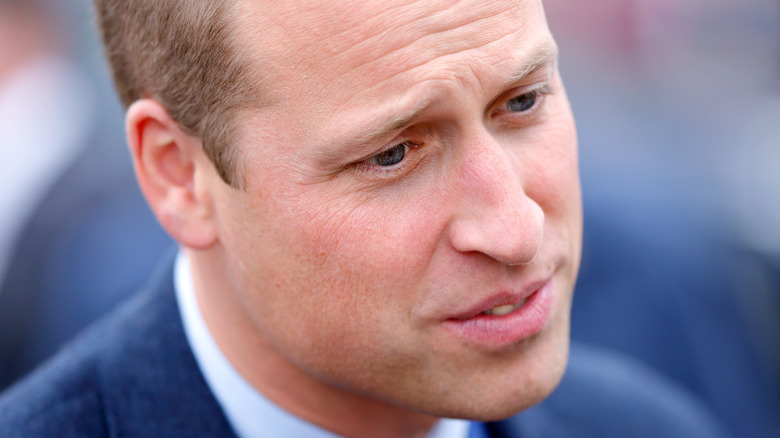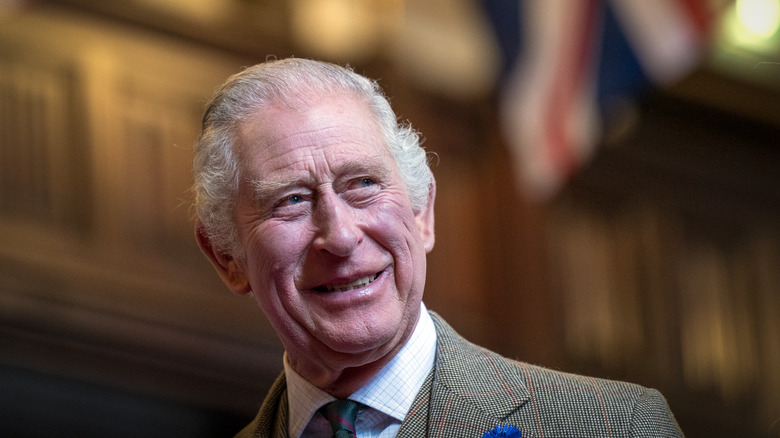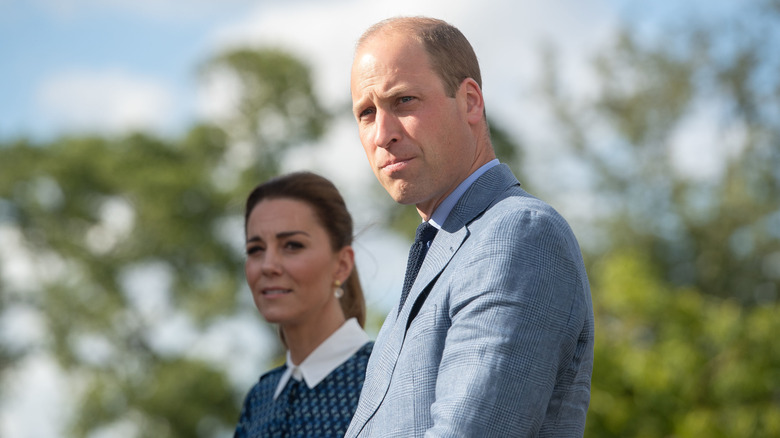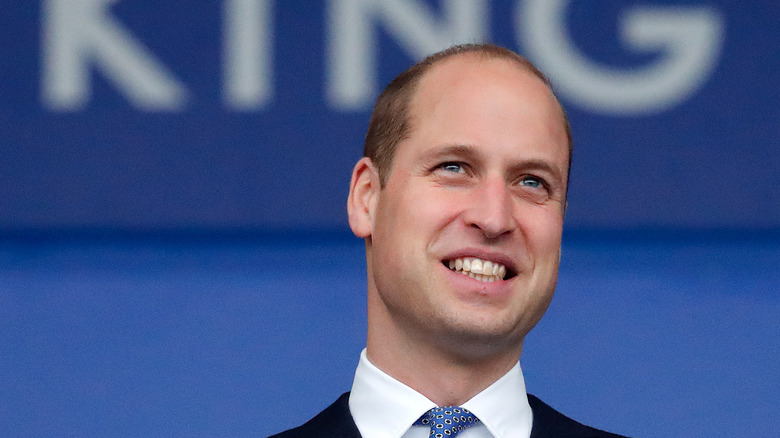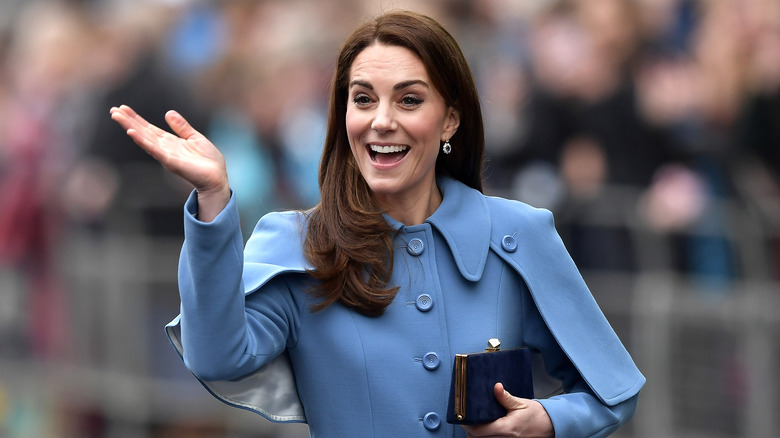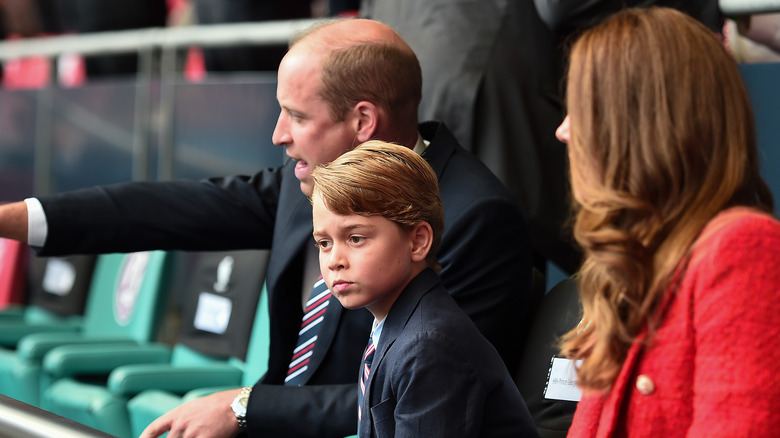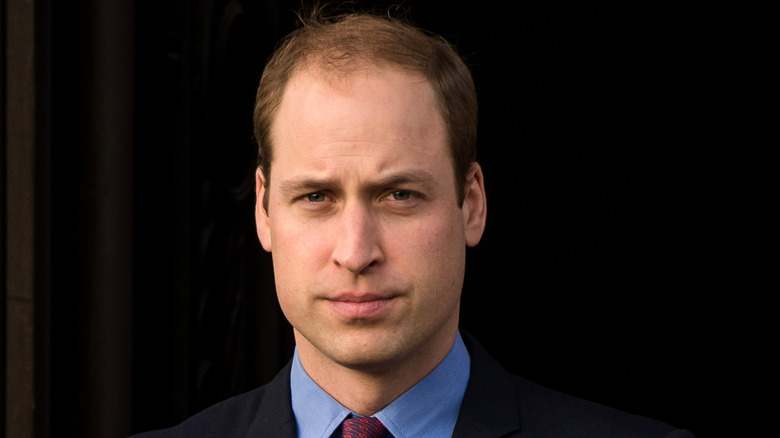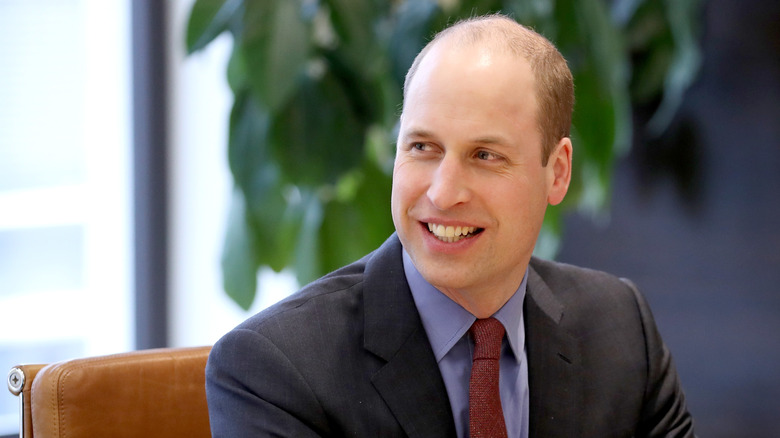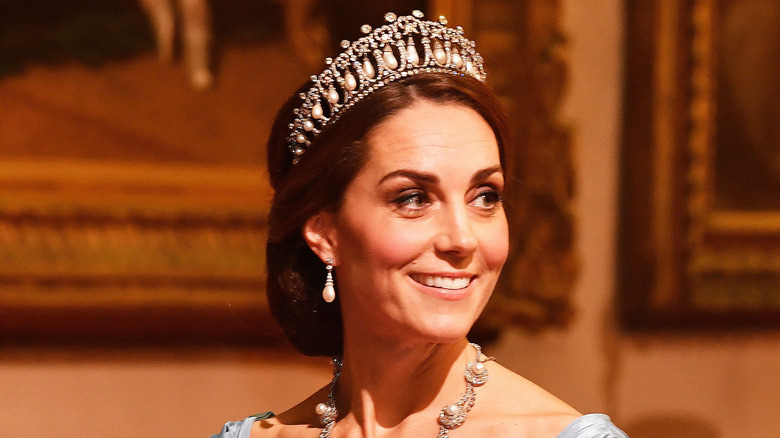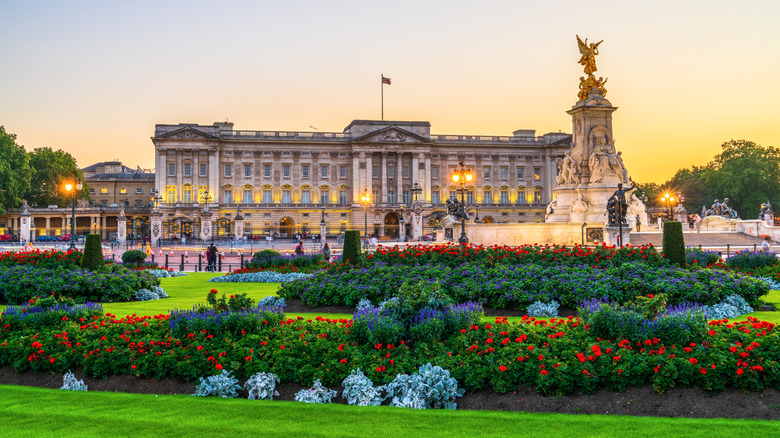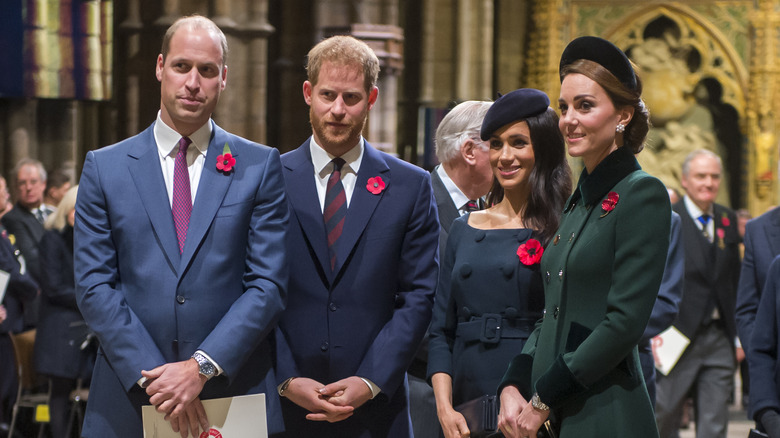What We Think Will Happen When Prince William Becomes King
While the world was thrust into a state of shock and mourning when news broke that Queen Elizabeth II had died at the age of 96, her eldest son was simultaneously named the new British monarch. Upon her immediate passing, the former Prince of Wales became King Charles III — and while we'll have to wait until May 6, 2023 to witness his coronation — Charles started executing the demands of the office from that tragic moment on.
Charles' early weeks as king have been a bit rocky — there were a few high profile moments with a pen that didn't cast him the most gracious light, and reports about the firing of Elizabeth's staff had many in a tizzy. Of course, the king's tumultuous relationship with the British public has made things far more difficult — his approval rating, YouGov notes, sits at around 44%, as compared to Queen Elizabeth's 73%. Who is sitting in between Charles and that coveted No. 1 approval rating spot? His son, Prince William, and the new Princess of Wales, Catherine.
It's no secret that many would have preferred to see William take the throne rather than his father, who is already 73 years old, as of publication. Calls for a more modern monarchy — coupled with William and Catherine's high approval ratings — have been cast on many occasions, and the public has already begun pondering what a William reign will look like. Given the all but ensured likelihood that William will take the throne in the not too distant future, here's what will happen when he eventually becomes king.
Some think that King Charles will step down by the time he's 80
For many members of the British public — and the world for that matter — it was hard to even think of the British monarchy when Queen Elizabeth II wasn't in charge. She sat on the throne for an impressive 70 years, reaching the advanced age of 96 and working up until two days before her death. She was, without question, dedicated to the crown unlike any other. And while King Charles III could have another two decades in him — taking him to 93 years old — the public might not get to see similar dedication in the same vein as his mother. Even as he took on the monarchy in the immediate wake of his mother's passing, Charles was on the receiving end of public pressure – far more people wanted (and still want) to see Prince William, Prince of Wales, as king, skipping Charles almost entirely.
And, while the monarchy seldom bows to public pressure, the late queen was said to have put a plan in motion to ensure her son steps down from the throne by the time he turns 80. A high ranking royal source told OK! Magazine that Elizabeth "devised a specific plan" before her death, ensuring that the monarchy would survive far past a possibly tumultuous Charles reign.
"Her Majesty isn't certain her family is up to the job of guiding Britain for the next 100 years," the source said, adding that she had a "no nonsense" meeting with the royals to ensure Charles doesn't rule past his 80th birthday.
If Charles abdicates, William will immediately become king
Queen Elizabeth II became the longest reigning monarch in British history with her impressive 70 years on the throne — for then-Prince Charles, that meant that as the heir apparent, he watched his mother serve decade after decade, the throne so close yet still so far. Now that he's 73 as of publication, Charles will surely have a much shorter time on the throne as compared to his mother — and if the queen's plans have any impact, he won't be ruling for longer than seven years or so.
But abdicating is a big thing when it comes to royal precedence, and giving up the crown to Prince William is something that King Charles III won't consider lightly. Reader's Digest firmly pointed out that abdication doesn't just mean retiring from the throne or taking on a lighter royal workload. Abdicating the throne is an adverse signaling of renouncement, all but rejecting the duties of the office — something that Charles likely won't want to embrace.
Of course, royal abdication has a rather sordid history. The last person to abdicate the throne was King Edward VIII, Queen Elizabeth II's uncle. Giving up the crown so he could marry American divorcée Wallis Simpson, Elizabeth's father, King George VI, was all but forced to rule. With this rather painful history, time will tell if Charles does give up the throne to William, which would make him one of the younger rulers in modern royal history.
William will have a coronation months after he takes the throne
When Prince William, Prince of Wales, does eventually take the throne — whether that's through an act of abdication on King Charles III's part or in the event of Charles' death — he will immediately be named king. As you may recall, Charles became king as soon as his mother, Queen Elizabeth II, died. Formalities — even the national anthem — were changed in the direct aftermath, shifting royal allegiances from the late queen to the new king.
In the event that William takes the throne, he will receive the title of king along with the responsibilities of the crown, but his actual coronation will likely take place months after. This will be the case for a variety of reasons — if William becomes king due to Charles' death, a national mourning period will follow, making an immediate coronation a bit inappropriate. Furthermore, a coronation takes ample planning and cannot be thrown together in a matter of weeks — it's an affair that takes months, if not years, to plan, so time is certainly needed to get everything right.
In fact, as of publication, King Charles III has yet to enjoy a coronation. As noted by the Daily Mail, Charles's coronation — known as Operation Golden Orb — is set to take place on May 6, 2023, almost eight months after the passing of Queen Elizabeth II.
Catherine will likely become queen consort
Quite a lot of attention was paid to Camilla Parker Bowles' title when she married then-Prince Charles, Prince of Wales, in 2005. As noted by Town & Country, it was announced at the time of the wedding that Camilla would take on the title of princess consort following her husband's ascension to the throne — it should of course be noted that Camilla had (and still has) a fairly low approval rating, as much of the public still see her as the "other woman" in the relationship between Charles and the late Diana Spencer. But, amid her Platinum Jubilee, Queen Elizabeth II announced that Camilla would instead take the title of queen consort, a rather significant jump. She is now colloquially referred to as Queen Camilla now that King Charles III is the reigning monarch, setting a precedent that Catherine, Princess of Wales, will surely follow.
As noted by Parade, Catherine — who married Prince William in 2011 — will most likely be named queen consort when her husband takes the throne. Why the "consort" designation? Consort is given to those who are royal by marriage, not royal by blood. Catherine, born to a wealthy but title-free family, was not royal until her wedding and as such will likely have the consort attachment. But, Parade notes, she will likely be called Queen Catherine by the public. If William were to die before Catherine and their eldest son — Prince George of Wales — was to take the throne, Catherine would likely be named the queen mother.
Prince George of Wales will be the direct heir to the throne
King Charles III has spent the majority of his life waiting to assume the throne. At 73 years old and having only just taken on the role, Charles is finally fulfilling a role that he's been preparing for since he was practically in diapers. As for Prince William, Charles' eldest son had been second in line to the throne for his entire life, but his position in the line of succession changed significantly when Queen Elizabeth II died.
William is now the direct heir to the throne. When Charles dies or abdicates (whichever comes first), William will become king, and his son, Prince George of Wales, will become the direct heir to the throne. George is only 9 years old as of publication and is already second in line to the throne, but the attention paid on the direct heir is quite a bit different — the direct heir, in many ways, represents the future of the monarchy. That's quite a lot of pressure to place on a kid still in elementary school.
So does George know that the future of Britain's monarchy will likely rest on his shoulders at some point during his lifetime? According to royal historian and writer Robert Lacey, William and Catherine, Princess of Wales, broke the news to him around his 7th birthday. "Sometime around the boy's seventh birthday in the summer of 2020 it is thought that his parents went into more detail about what the little prince's life of future royal 'service and duty' would particularly involve," Lacey asserted, per Marie Claire.
Thanks to an act passed in 2013, Princess Charlotte will ensure her spot in the line of succession
The line of royal succession can get a little bit complicated, but when Prince William inevitably becomes king, his daughter, Princess Charlotte, will become second in line to the throne. As things stand now, William is the direct heir; his son, Prince George, is second in line; and Charlotte is third in line. However, it is only thanks to an act passed in 2013 that Charlotte won't be circumvented in the succession line, and we're here to break it all down.
King Charles was, of course, the direct heir to the British throne for decades. When she was born, Princess Anne — Charles's younger sister and Queen Elizabeth II's second eldest child — was directly behind him. But when Elizabeth had Prince Andrew and Prince Edward, the two younger siblings jumped ahead of Anne in the line of succession, all thanks to her gender. As Charles, Andrew, and Edward had children of their own, Anne's place in line continued to get pushed back — as it stands, Anne is 16th in line to the throne, despite being Elizabeth's second-eldest child.
Thanks to the Succession to the Crown Act, William's daughter, Charlotte, will maintain her spot in the royal line, unlike Anne. If and when her older brother, George, has children of his own, her place will start to drop, but the shift she may experience won't be nearly as severe.
William will have to choose a ruling name
In one of the more famous scenes from Netflix's hit series "The Crown," the fictional Elizabeth is asked what she'd like her regnal name to be. "Let's not overcomplicate matters unnecessarily," the on-screen monarch attests. "My name is Elizabeth." Of course, the scene got to the heart of a topic Prince William will have to address when he becomes king — what name he would like to be called.
When we look back in time, it can be easily identified that royal names have changed (although the shifts do cause a little bit of confusion). As noted by The Washington Post, King George VI — Elizabeth's father — was named Albert Frederick Arthur George at birth. Yet, when it came time for him to assume the throne, he went by George as a nod to his father. But of course, Queen Elizabeth II chose to maintain her birth name as ruler, as has King Charles III. The Washington Post further noted that this came as a little bit of a surprise, given that King Charles I was seen as a "tyrant" and King Charles II had quite the "playboy" reputation.
So, when William inevitably takes the throne, he will have to decide whether he wants to maintain his name or choose a different moniker. As noted by Britannica, he was born William Arthur Philip Louis, so he does have three other names to choose from if he wishes.
The new king will likely travel across Great Britain and meet with Commonwealth leaders
As his role as direct heir to the British throne stands, Prince William makes his dedication to the crown known through his work as a senior royal. He and his wife Catherine, Princess of Wales, are often seen at public events that support charities, organizations, and causes they care about. They also represent the crown and the royal family as a whole on international trips — although their Caribbean tour in early 2022 was a bit of a disaster. But, when William becomes king, his duties will expand quite significantly as he will be expected to travel to Commonwealth countries and regularly meet with leaders.
As noted by Town & Country, one of the first aspects of the job that King Charles III executed — even in the immediate wake of his mother's passing — was meeting with Commonwealth representatives. The newly named king also traveled around Great Britain, meeting with mourners and uniting the country as it experienced the passing of a beloved monarch. William will likely be expected to do the same — and given that he will most definitely be younger than his father when he assumes the throne, the virile new king may even be expected to hit the road often.
Of course, it will be quite a bit easier for William to travel as compared to us commonplace folks. As noted by Express, William will no longer need a passport when he becomes king — no pesky customs and immigration for him.
Catherine's access to the crown jewels will change dramatically
When we think about life as a royal in the general sense, thoughts of castles, crowns, and ballgowns immediately spring to mind. While life as a working royal has far more to do with charity and volunteer work than parading around in a tiara, those with access to the crown jewels — and the late Queen Elizabeth II's jewelry collection — certainly dazzle on occasion. This brings us to William, Prince of Wales, and his eventual assumption of the throne. When William succeeds his father, William's wife, Catherine, Princess of Wales, will have complete access to the crown jewels. Paying attention to royal etiquette, of course, it's likely that royal fans will see Catherine in some incredible jewels, Cafe Mom notes.
As Historic Royal Palaces points out, the crown jewels collection is made up of more than 100 individual items, comprised of 23,000 gemstones and counting. As one may assume, the crown jewels are priceless, as historical objects, cultural pieces, and extraordinary stones make up the body of work.
As queen consort, Catherine will likely continue to incorporate pieces of jewelry gifted to her by the late Queen Elizabeth II, but will surely take advantage of the access she will have to the extraordinary collection. After all, what is royal life without a dazzling tiara to top off a once-in-a-lifetime gown?
The king and queen consort will likely move to Buckingham Palace
Perhaps one of the most visited sites in London is Buckingham Palace, naturally, given its central location and prominent position as the dominant home for ruling royals. Queen Elizabeth II — when not at Windsor or Scotland's Balmoral Castle — spent a significant amount of time at Buckingham Palace, allowing for regular audiences with prime ministers, official events, and more royal duties to take place. As such, it is likely that when Prince William takes the throne, he and his family will move onto the Buckingham Palace grounds.
The subject of where William and Catherine, Princess of Wales, live has been in the news recently given their departure from London's Kensington Palace in the summer of 2022. Opting for a quieter life in the country, William and Catherine decided on Windsor as their primary residence, allowing their children more privacy and a school life not encumbered by prying paparazzi, NBC News notes. It should be included, however, that William and Catherine have retained their Kensington and Norfolk mansion properties — one incredible home is simply not enough for a royal family.
Despite their current residence at Windsor, the Wales family will likely relocate when William eventually takes the throne, allowing him to be far more present and readily available for any and all royal duties.
The royal family could become even more condensed after William takes the throne
The royal family, as it stands, has a number of stars. Prince William and Catherine, Prince and Princess of Wales, are just a few of the family members who dominate the headlines — and are positively rivaled by Prince Harry and Meghan, Duchess of Sussex. King Charles III and Camilla, Queen Consort, will continue to have their 1980s infidelity story told as long as they are alive, and positively disgraced royals — one Prince Andrew comes to mind — will always remain a dark stain on the family's reputation. With so many moving parts — and so much drama to keep at bay — it didn't come as a huge shock to learn that even before taking the throne, King Charles III had plans to make the royal family considerably smaller.
"The king has long been an advocate of a streamlined or slimmed down monarchy," a source told The Mirror of Charles' plans to consolidate a much smaller circle of senior royals. And while we're still in the early days of his reign as of publication, it's likely that we'll see a continuation of Charles' boundaries during William's reign.
Of course, one only has to look at William's ongoing feud with his younger brother, Harry, to get a sense of where allegiances lie. While Harry has made it clear that he prioritizes his wife, children, and mental health above all else, William has displayed his dedication to the crown. It is likely this perspective will be maintained — and perhaps increased — over time.
